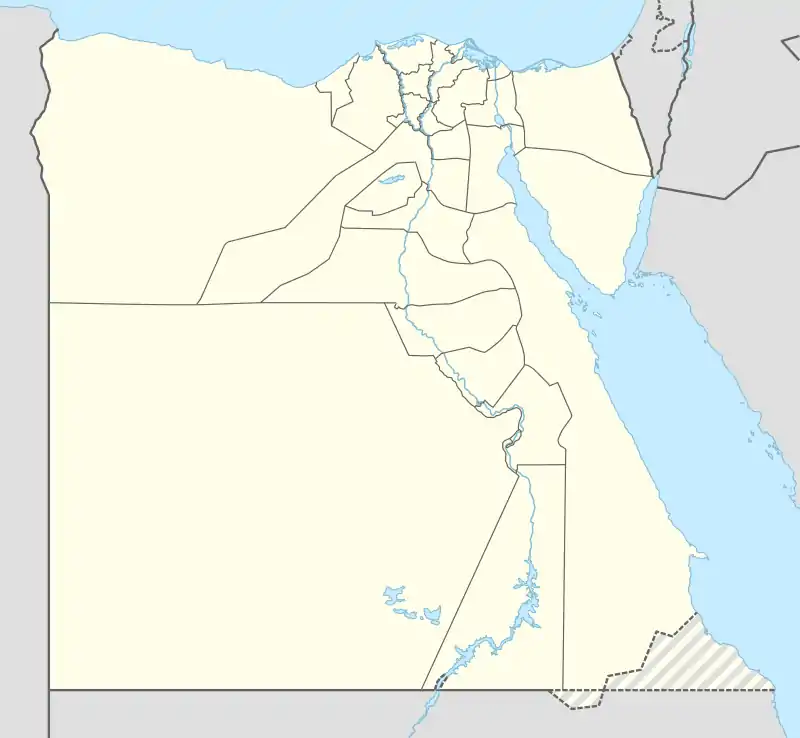Ras Sedr
Ras Sedr (Also spelled: Ras Sidr, Ras Sudr, or Ras Sudar; Arabic: راس سدر; Coptic: Ⲣⲁⲥ ⲥⲉⲇⲣ Rās Sedr pronounced [ɾɑːs sedɾ]) is an Egyptian town located on the Gulf of Suez and the Red Sea coast. It is a part of the South Sinai Governorate, and consists of three areas: Wadi Sidr, Abu Sidr and Soerp. The region has been known since ancient biblical times.
Ras Sedr
Coptic: Ⲣⲁⲥ ⲥⲉⲇⲣ | |
|---|---|
 Ras Sedr Location in Egypt | |
| Coordinates: 29°35′30″N 32°42′20″E | |
| Country | |
| Governorate | South Sinai |
| Time zone | UTC+2 (EST) |
Geography
Ras Sidr is 200 km from Cairo and approx 60 km from the Ahmed Hamdi Tunnel crossing in Suez, on the western side of the Sinai Peninsula, and almost opposite the resort of Ayn El Sokhna on the opposite Red Sea coastline. The main travelling road to Ras Sidr is by way of the main Suez to Sharm el Sheikh Road through almost total desert terrain. The road is dotted with farms where olives, tamarinds, and fruits are grown.
The majority of the town and outlying districts are inhabited by Sinai Bedouins who live in the areas of Wadi Abu Sidr and Soerp. Ras Sedr itself is made up of two residential areas, bisected by the main north/south road. One side contains local housing for workers, who mainly come from the north of Egypt and the Nile Valley. The other contains private villa residences for professionals and second holiday homes whose owners are mainly from Cairo. There is also a large souk area with many shops and services including telephone, post office, internet services, council offices and a police station. Tradesmen of every kind can be found in the artisans' souk area. There is also a small military airstrip, which is being debated whether to build a civilian airport there or the military continues to use it.
Attractions
Ras Sidr has a 95 km beach coastline which offers waters for swimming and sea sports. The area also attracts bird watchers as tourists can see different species of migrating birds. Shallow water beaches and constantly blowing wind, makes Ras. Sedr one of the best kite surfing sites in the world. La Hacienda beach resort is suitable for beginners as the wind carries the kite surfers towards the beach not away from it.
Climate
Köppen-Geiger climate classification system classifies its climate as hot desert (BWh).[1]
| Climate data for Ras Sedr | |||||||||||||
|---|---|---|---|---|---|---|---|---|---|---|---|---|---|
| Month | Jan | Feb | Mar | Apr | May | Jun | Jul | Aug | Sep | Oct | Nov | Dec | Year |
| Record high °C (°F) | 26.0 (78.8) |
30.6 (87.1) |
36.5 (97.7) |
37.0 (98.6) |
43.2 (109.8) |
42.3 (108.1) |
43.3 (109.9) |
42.3 (108.1) |
41.0 (105.8) |
37.6 (99.7) |
31.5 (88.7) |
27.0 (80.6) |
43.3 (109.9) |
| Average high °C (°F) | 18.9 (66.0) |
20.5 (68.9) |
22.8 (73.0) |
27.3 (81.1) |
31.2 (88.2) |
34.0 (93.2) |
35.1 (95.2) |
34.8 (94.6) |
32.2 (90.0) |
28.9 (84.0) |
24.3 (75.7) |
20.4 (68.7) |
27.5 (81.5) |
| Daily mean °C (°F) | 13.6 (56.5) |
14.9 (58.8) |
16.8 (62.2) |
20.8 (69.4) |
24.0 (75.2) |
26.8 (80.2) |
28.3 (82.9) |
28.3 (82.9) |
26.3 (79.3) |
23.1 (73.6) |
18.4 (65.1) |
15.0 (59.0) |
21.4 (70.5) |
| Average low °C (°F) | 8.1 (46.6) |
9.0 (48.2) |
10.6 (51.1) |
14.1 (57.4) |
17.2 (63.0) |
19.9 (67.8) |
21.7 (71.1) |
22.0 (71.6) |
20.0 (68.0) |
17.4 (63.3) |
13.0 (55.4) |
9.6 (49.3) |
15.2 (59.4) |
| Record low °C (°F) | 2.8 (37.0) |
0.0 (32.0) |
4.6 (40.3) |
6.9 (44.4) |
10.8 (51.4) |
14.0 (57.2) |
17.6 (63.7) |
18.8 (65.8) |
15.4 (59.7) |
11.5 (52.7) |
9.3 (48.7) |
3.8 (38.8) |
0.0 (32.0) |
| Average precipitation mm (inches) | 4 (0.2) |
2 (0.1) |
3 (0.1) |
2 (0.1) |
0 (0) |
0 (0) |
0 (0) |
0 (0) |
0 (0) |
0 (0) |
1 (0.0) |
3 (0.1) |
15 (0.6) |
| Average precipitation days (≥ 1.0 mm) | 0.1 | 0.1 | 0.1 | 0 | 0 | 0 | 0 | 0 | 0 | 0 | 0 | 0.1 | 0.4 |
| Average relative humidity (%) | 60 | 57 | 57 | 53 | 51 | 53 | 54 | 58 | 60 | 62 | 61 | 60 | 57.2 |
| Source 1: NOAA[2] | |||||||||||||
| Source 2: Climate-Data.org[1] | |||||||||||||
References
- "Climate: Ras Sudr - Climate graph, Temperature graph, Climate table". Climate-Data.org. Retrieved 15 August 2013.
- "Ras Sedr Climate Normals 1961–1990". National Oceanic and Atmospheric Administration. Retrieved January 17, 2016.
